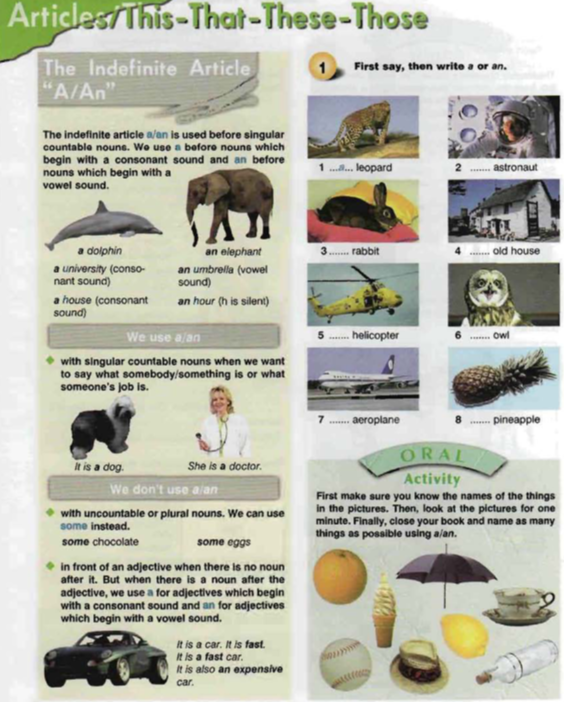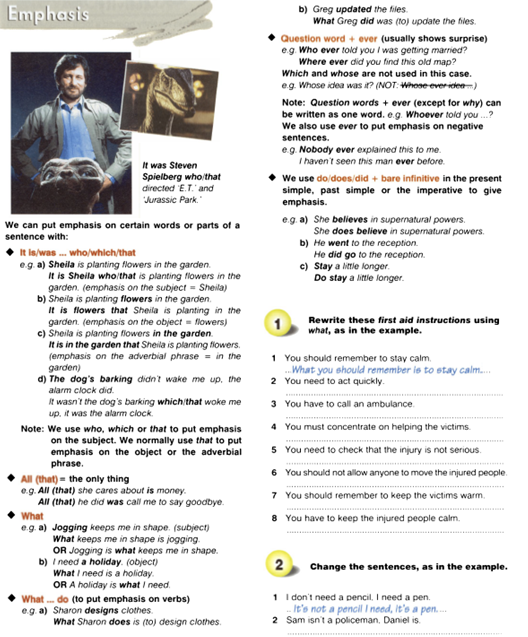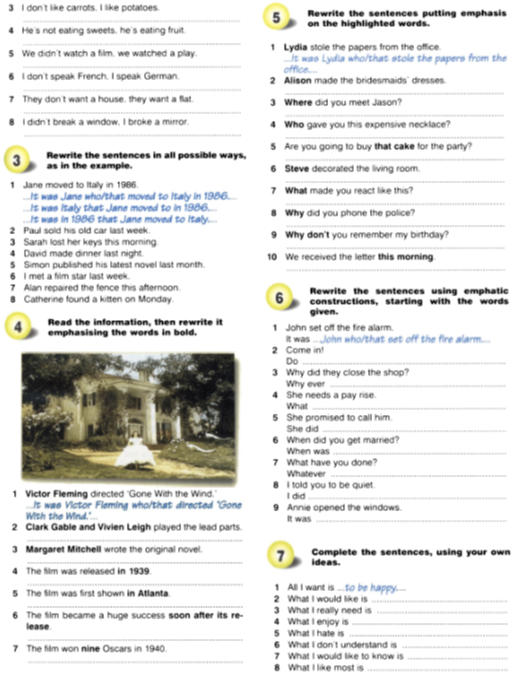-
Articles: This-That-These-Those
-
Emphasis
-
Article
-
Phrasal verbs – Part 8
Phrasal verbs – Part 8
Phrasal verb meaning example sentence
run into someone/something: meet unexpectedly: I ran into an old school-friend at the mall.
run over someone/something: drive a vehicle over a person or thing: I accidentally ran over your bicycle in the driveway.
run over/through something: rehearse, review: Let’s run over/through these lines one more time before the show.
run away: leave unexpectedly, escape: The child ran away from home and has been missing for three days.
run out: have none left: We ran out of shampoo so I had to wash my hair with soap.
send something back: return (usually by mail): My letter got sent back to me because I used the wrong stamp.
set something up: arrange, organize: Our boss set a meeting up with the president of the company.
set someone up: trick, trap: The police set up the car thief by using a hidden camera.
shop around: compare prices: I want to shop around a little before I decide on these boots.
show off: act extra special for people watching (usually boastfully): He always shows off on his skateboard
sleep over: stay somewhere for the night (informal): You should sleep over tonight if the weather is too bad to drive home.
sort something out: organize, resolve a problem: We need to sort the bills out before the first of the month.
stick to something: continue doing something, limit yourself to one particular thing: You will lose weight if you stick to the diet.
switch something off: stop the energy flow, turn off: The light’s too bright. Could you switch it off.
switch something on: start the energy flow, turn on: We heard the news as soon as we switched on the car radio.
-
Conjunctive adverbs
Conjunctive adverbs:
These adverbs can just connect 2 independent clauses
These conjunction are divided into 5 groups based on their function:
۱. Conjunctive adverbs of addition:
besides – furthermore – moreover – in addition – in fact – also – additionally
Watching TV is a passive activity; in addition, it wastes people’s time.
۲٫ Conjunctive adverbs of cause / result:
therefore – consequently – as a result – thus – hence
Smoking is dangerous to one’s life; therefore, it is banned in public places.
۳. Conjunctive adverbs of contrast:
however – nevertheless – still – on the contrary – nonetheless
Overseas student experience a different life; however, they may feel homesick.
*The structure of the sentence after on the contrary must be opposite the one before or after that …
Example:
The teacher wasn’t angry with the …; on the contrary, he was happy with …
Smoking is dangerous; still, millions of people …
۴٫ Conjunctive adverbs of condition:
otherwise
We must save on water sources; otherwise, we will run out of potable water in future.
۵٫ Conjunctive adverbs of sequence:
then – later – afterward
At first, I decided to join the demonstration; later changed my mind.
-
Phrasal verbs – Part 7
Phrasal verbs – Part 7
Phrasal verb meaning example sentence
pass away: die: His uncle passed away last night after a long illness.
pass out: faint: It was so hot in the church that an elderly lady passed out.
pass something out: give the same thing to many people: The professor passed the textbooks out before class.
pass something up: decline (usually something good): I passed up the job because I am afraid of change.
pay someone back: return owed money: Thanks for buying my ticket. I’ll pay you back on Friday.
pay for something: be punished for doing something bad: That bully will pay for being mean to my little brother.
pick something out: choose: I picked out three sweaters for you to try on.
point someone/something out: indicate with your finger: I’ll point my boyfriend out when he runs by.
put something down: put what you are holding on a surface or floor: You can put the groceries down: on the kitchen counter.
put someone down: insult, make someone feel stupid: The students put the substitute teacher down because his pants were too short.
put something off: postpone: We are putting off our trip until January because of the hurricane.
put something out: extinguish: The neighbors put the fire out before the firemen arrived.
put something together: assemble: I have to put the crib together before the baby arrives.
put up with someone/something: tolerate: I don’t think I can put up with three small children in the car.
put something on: put clothing/accessories on your body: Don’t forget to put on your new earrings for the party.
-
Phrasal verbs – Part 6
Phrasal verbs – Part 6
Phrasal verb meaning example sentence
let someone down: fail to support or help, disappoint: I need you to be on time. Don’t let me down this time.
let someone in: allow to enter: Can you let the cat in before you go to school?
log in (or on): sign in (to a website, database etc): I can’t log in to Facebook because I’ve forgotten my password.
log out (or off): sign out (of a website, database etc): If you don’t log off somebody could get into your account.
look after someone/something: take care of: I have to look after my sick grandmother.
look down on someone: think less of, consider inferior: Ever since we stole that chocolate bar your dad has looked down on me.
look for someone/something: try to find: I’m looking fora red dress for the wedding.
look forward to something: be excited about the future: I’m looking forward to the Christmas break.
look into something: investigate: We are going to look into the price of snowboards today.
look out: be careful, vigilant, and take notice: Look out! That car’s going to hit you!
look out for someone/something: be especially vigilant for: Don’t forget to look out for snakes on the hiking trail.
look something over: check, examine: Can you look over my essay for spelling mistakes?
look something up: search and find information in a reference book or database: We can look her phone number up on the Internet.
look up to someone: have a lot of respect for: My little sister has always looked up to me.
make something up: invent, lie about something: Josie made up a story about why we were late.
make up: forgive each other: We were angry last night, but we made up at breakfast.
make someone up: apply cosmetics to: My sisters made me up for my graduation party.
mix something up: confuse two or more things: I mixed up the twins’ names again!
-
Phrasal verbs – Part 5
Phrasal verbs – Part 5
Phrasal verb meaning example sentence
hand something down: give something used to someone else: I handed my old comic books down to my little cousin.
hand something in: submit: I have to hand in my essay by Friday.
hand something out: to distribute to a group of people: We will hand out the invitations at the door.
hand something over: give (usually unwillingly): The police asked the man to hand over his wallet and his weapons.
hang in: stay positive (informal): Hang in there. I’m sure you’ll find a job very soon.
hang on: wait a short time (informal): Hang on while I grab my coat and shoes!
hang out: spend time relaxing (informal): Instead of going to the party we are just going to hang out at my place.
hang up: end a phone call: He didn’t say goodbye before he hung up.
hold someone/something back: prevent from doing/going: I had to hold my dog back because there was a cat in the park.
hold something back: hide an emotion: Jamie held back his tears at his grandfather’s funeral.
hold on: wait a short time: Please hold on while I transfer you to the Sales Department.
hold onto someone/something: hold firmly using your hands or arms: Hold onto your hat because it’s very windy outside.
hold someone/something up: rob: A man in a black mask held the bank up this morning.
keep on doing something: continue doing: Keep on stirring until the liquid comes to a boil.
keep something from someone: not tell: We kept our relationship from our parents for two years.
keep someone/something out: stop from entering: Try to keep the wet dog out of the living room.
keep something up: continue at the same rate: If you keep those results up you will get into a great college.
-
Phrasal verbs – Part 4
Phrasal verbs – Part 4
Phrasal verb Meaning Example sentence
get something across/over: communicate, make understandable: I tried to get my point across/over to the judge but she wouldn’t listen.
get along/on: like each other: I was surprised how well my new girlfriend and my sister got along/on.
get around: have mobility: My grandfather can get around fine in his new wheelchair.
get away: go on a vacation: We worked so hard this year that we had to get away for a week.
get away with something: do without being noticed or punished: Jason always gets away with cheating in his maths tests.
get back: return: We got back from our vacation last week.
get something back: receive something you had before :Liz finally got her Science notes back from my room-mate.
get back at someone: retaliate, take revenge: My sister got back at me for stealing her shoes. She stole my favorite hat.
get back into something: become interested in something again: I finally got back into my novel and finished it.
get on something: step onto a vehicle: We’re going to freeze out here if you don’t let us get on the bus.
get over something: recover from an illness, loss, difficulty: I just got over the flu and now my sister has it.
get over something: overcome a problem: The company will have to close if it can’t get over the new regulations.
get round to something: finally find time to do (Ame: get around to something): I don’t know when I am going to get round to writing the thank you cards.
get together: meet (usually for social reasons): Let’s get together for a BBQ this weekend.
get up: get out of bed: I got up early today to study for my exam.
get up: stand: You should get up and give the elderly man your seat.
give someone away: reveal hidden information about someone: His wife gave him away to the police.
give someone away: take the bride to the altar: My father gave me away at my wedding.
give something away: ruin a secret: My little sister gave the surprise party away by accident.
give something away: give something to someone for free: The library was giving away old books on Friday.
give something back: return a borrowed item: I have to give these skates back to Franz before his hockey game.
give in: reluctantly stop fighting or arguing: My boyfriend didn’t want to go to the ballet, but he finally gave in.
give something out: give to many people (usually at no cost): They were giving out free perfume samples at the department store.
give something up: quit a habit: I am giving up smoking as of January 1st.
give up: stop trying: My maths homework was too difficult so I gave up.
go after someone: follow someone: My brother tried to go after the thief in his car.
go after something: try to achieve something: I went after my dream and now I am a published writer.
go against someone: compete, oppose: We are going against the best soccer team in the city tonight.
go ahead: start, proceed: Please go ahead and eat before the food gets cold.
go back: return to a place: I have to go back home and get my lunch.
go out: leave home to go on a social event: We’re going out for dinner tonight.
go out with someone: date: Jesse has been going out with Luke since they met last winter.
go over something: review: Please go over your answers before you submit your test.
go over: visit someone nearby: I haven’t seen Tina for a long time. I think I’ll go over for an hour or two.
go without something: suffer lack or deprivation: When I was young, we went without winter boots.
grow apart: stop being friends over time: My best friend and I grew apart after she changed schools. grow back regrow: My roses grew back this summer.
grow up: become an adult: When Jack grows up he wants to be a fireman.
grow out of something: get too big for: Elizabeth needs a new pair of shoes because she has grown out of her old ones.
grow into something: grow big enough to fit: This bike is too big for him now, but he should grow into it by next year.
-
Phrasal verb – Part 3
Phrasal verb – Part 3
Phrasal verb meaning example sentenc
do someone/something over: beat up, ransack (BrE, informal): He’s lucky to be alive. His shop was done over by a street gang.
do something over: do again (AmE): My teacher wants me to do my essay over because she doesn’t like my topic.
do away with something: discard: It’s time to do away with all of these old tax records.
do something up: fasten, close: Do your coat up before you go outside. It’s snowing!
dress up: wear nice clothing : It’s a fancy restaurant so we have to dress up.
drop back: move back in a position/group :Andrea dropped back to third place when she fell off her bike.
drop in/by/over: come without an appointment :I might drop in/by/over for tea sometime this week.
drop someone/something off: take someone/something somewhere and leave them/it there: I have to drop my sister off at work before I come over.
drop out: quit a class, school etc. :I dropped out of Science because it was too difficult.
eat out: eat at a restaurant :I don’t feel like cooking tonight. Let’s eat out.
end up: eventually reach/do/decide :We ended up renting a movie instead of going to the theatre.
fall apart: break into pieces: My new dress fell apart in the washing machine.
fall down: fall to the ground: The picture that you hung up last night fell down this morning.
fall out: separate from an interior: The money must have fallen out of my pocket.
fall out(of hair, teeth): become loose and unattached :His hair started to fall out when he was only 35.
figure something out: understand, find the answer :I need to figure out how to fit the piano and the bookshelf in this room.
fill something in: to write information in blanks, as on a form (BrE): Please fill in the form with your name, address, and phone number.
fill something out: to write information in blanks, as on a form (AmE): The form must be filled out in capital letters.
fill something up: fill to the top: I always fill the water jug up when it is empty.
find out: discover: We don’t know where he lives. How can we find out?
find something out: discover: We tried to keep the time of the party a secret, but Samantha found it out.



